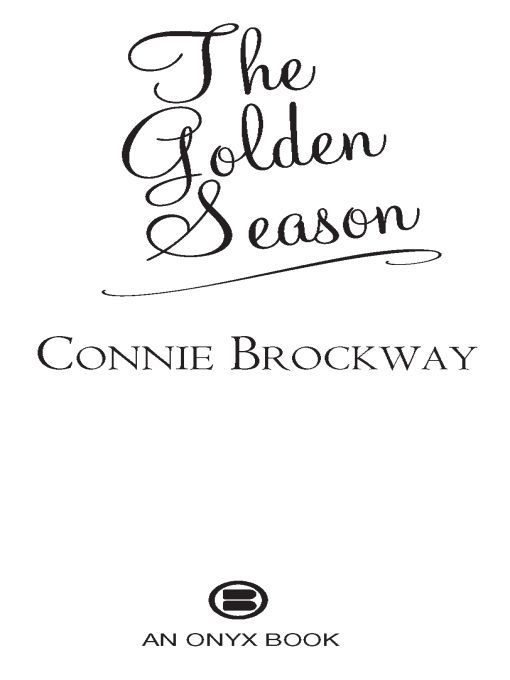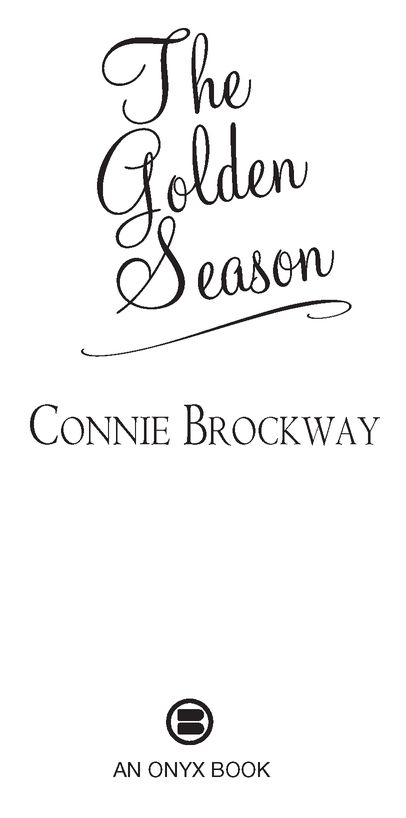The Golden Season
Authors: Connie Brockway


Table of Contents
Praise for the Novels of Connie Brockway
So Enchanting
“Exceptionally entertaining characters, a wildly original
plot that cleverly spoofs the spiritualist craze of the late
Victorian era, and deliciously humorous writing give
So
Enchanting
its bewitchingly irresistible charm.”
plot that cleverly spoofs the spiritualist craze of the late
Victorian era, and deliciously humorous writing give
So
Enchanting
its bewitchingly irresistible charm.”
—Chicago Tribune
—Library Journal
—Booklist
Skinny Dipping
Skinny Dipping
, Connie Brockway’s latest beguiling tale of a woman who discovers life is all about commitment.”
—Chicago Tribune
—Booklist
—Romantic Times
—Minnesota Monthly
—Romance Junkies
—Library Journal
Hot Dish
—Elizabeth Bevarly
—Christina Dodd
—Eloisa James
—Teresa Medeiros
—Romantic Times
—All About Romance
Hot Dish
is simply superb.”
—Booklist
ALSO BY CONNIE BROCKWAY
Hot Dish
Skinny Dipping
So Enchanting
Skinny Dipping
So Enchanting

ONYX
Published by New American Library, a division of
Penguin Group (USA) Inc., 375 Hudson Street,
New York, New York 10014, USA
Penguin Group (Canada), 90 Eglinton Avenue East, Suite 700, Toronto,
Ontario M4P 2Y3, Canada (a division of Pearson Penguin Canada Inc.)
Penguin Books Ltd., 80 Strand, London WC2R 0RL, England
Penguin Ireland, 25 St. Stephen’s Green, Dublin 2,
Ireland (a division of Penguin Books Ltd.)
Penguin Group (Australia), 250 Camberwell Road, Camberwell, Victoria 3124,
Australia (a division of Pearson Australia Group Pty. Ltd.)
Penguin Books India Pvt. Ltd., 11 Community Centre, Panchsheel Park,
New Delhi - 110 017, India
Penguin Group (NZ), 67 Apollo Drive, Rosedale, North Shore 0632,
New Zealand (a division of Pearson New Zealand Ltd.)
Penguin Books (South Africa) (Pty.) Ltd., 24 Sturdee Avenue,
Rosebank, Johannesburg 2196, South Africa
Penguin Group (USA) Inc., 375 Hudson Street,
New York, New York 10014, USA
Penguin Group (Canada), 90 Eglinton Avenue East, Suite 700, Toronto,
Ontario M4P 2Y3, Canada (a division of Pearson Penguin Canada Inc.)
Penguin Books Ltd., 80 Strand, London WC2R 0RL, England
Penguin Ireland, 25 St. Stephen’s Green, Dublin 2,
Ireland (a division of Penguin Books Ltd.)
Penguin Group (Australia), 250 Camberwell Road, Camberwell, Victoria 3124,
Australia (a division of Pearson Australia Group Pty. Ltd.)
Penguin Books India Pvt. Ltd., 11 Community Centre, Panchsheel Park,
New Delhi - 110 017, India
Penguin Group (NZ), 67 Apollo Drive, Rosedale, North Shore 0632,
New Zealand (a division of Pearson New Zealand Ltd.)
Penguin Books (South Africa) (Pty.) Ltd., 24 Sturdee Avenue,
Rosebank, Johannesburg 2196, South Africa
Penguin Books Ltd., Registered Offices: 80 Strand, London WC2R 0RL, England
First published by Onyx, an imprint of New American Library, a division of Penguin Group (USA) Inc.
First Printing, February
Copyright © Connie Brockway, 2010
Excerpt from
So Enchanting
copyright © Connie Brockway, 2009 All rights reserved
So Enchanting
copyright © Connie Brockway, 2009 All rights reserved
 REGISTERED TRADEMARK—MARCA REGISTRADA
REGISTERED TRADEMARK—MARCA REGISTRADAeISBN : 978-1-101-18478-3
Without limiting the rights under copyright reserved above, no part of this publication may be reproduced, stored in or introduced into a retrieval system, or transmitted, in any form, or by any means (electronic, mechanical, photocopying, recording, or otherwise), without the prior written permission of both the copyright owner and the above publisher of this book.
PUBLISHER’S NOTE
This is a work of fiction. Names, characters, places, and incidents either are the product of the author’s imagination or are used fictitiously, and any resemblance to actual persons, living or dead, business establishments, events, or locales is entirely coincidental. The publisher does not have any control over and does not assume any responsibility for author or third-party Web sites or their content.
The scanning, uploading, and distribution of this book via the Internet or via any other means without the permission of the publisher is illegal and punishable by law. Please purchase only authorized electronic editions, and do not participate in or encourage electronic piracy of copyrighted materials. Your support of the author’s rights is appreciated.
For Lilah , whom I loved before I met
Chapter One
March 1816“You had best look over these papers, Lady Lydia,” said Robert Terwilliger, senior partner of the Royal Bank of London, to the exquisitely beautiful woman sitting across the desk from him. The beauty reluctantly accepted the sheaf of papers he held out and began reading, allowing Terwilliger the opportunity to study her.
At twenty-four, when most young ladies would have been considered on the shelf, Lady Lydia Eastlake showed no signs of relinquishing her place not only as one of the
ton
’s most notable nonpareil but
the
nonpareil.
ton
’s most notable nonpareil but
the
nonpareil.
Even Terwilliger, no follower of fashion—his three grown daughters’ attempts to educate him notwitstanding—could appreciate Lydia Eastlake’s dash. Ecru- fluted silk trimmed the emerald green pelisse covering her elegant and well-curved figure, while her shimmering burnt-caramel-colored curls peeked out from beneath a spring bonnet bedecked with feathers, fronds, and flowers. The glossy locks framed a face noted for the perfect proportion of her small, angular jaw, straight nose, arched dark brows, and high cheekbones.
And then there were the eyes: long, dark lashed, and exotically tilted, they were a color so vividly, deeply blue that they appeared purple. Strong men, it was said, could lose themselves in the thrall of her eyes.
Robert Terwilliger was not a strong man. And it would take a very strong man indeed to rein in the likes of Lady Lydia Eastlake. She was a headstrong, self-indulgent voluptuary, but also absolutely captivating, utterly charming, and infectiously merry. But worse, she was completely independent.
Since she’d come of age three years ago, Lady Lydia had not been under any single man’s supervision as daughter, sister, niece, wife, widow, or ward.
Terwilliger hadn’t known her parents personally, having inherited the position as her personal banker, but he’d heard of them. Their affair had been for a short while notorious.
His older brother’s death had left Ronald Eastlake heir to an enormous fortune that had its basis in the noble family’s many ancestral land holdings and had been expanded by his brother’s willingness to invest in trade—literally. The Eastlakes owned a shipping empire. It had also left his brother’s widow, Julia, free to marry.
That the pair had been in love for some time was obvious, for no sooner was the mourning period ended than Eastlake convinced Julia to elope with him to France because no clergy in the country had been willing to marry them. They’d cited “affinity”—the old biblical edict against marrying one’s brother’s widow—as a reason.
Luckily, the French clergy was not so traditional.
Once wed, because of the enormous fortune involved, and because anyone might bring a suit to have the marriage annulled on the grounds of affinity against them, they decided never to return to England and put their marriage at risk. Their resolve to uphold this decision was strengthened by the birth of their daughter less than a year later.
By all reports—and there were many—exile suited them very well. The Eastlakes were renowned in international circles for their glamorous, globe-trotting lifestyle, their recklessness and their laissez-faire attitudes. They’d taken Lydia with them everywhere they went. The courts of Europe had been her playgrounds, the far reaches of the English empire her backyard.
Famous, sought after, rich, and in love they might have been, but to Terwilliger’s mind none of that excused their neglect of their child’s future. The notion that they might not always be young and vibrant and alive apparently never occurred to them, for they’d neglected to make provisions for the care of their only child should something happen to them. Which it had, in the form of a fatal carriage accident.
Other books
Brain Rules for Baby by John Medina
Her Homecoming Cowboy by Debra Clopton
Three Promises by Bishop O'Connell
The Thief Who Pulled on Trouble's Braids by Michael McClung
Final Target by Iris Johansen
Seer: Thrall by Robin Roseau
Harkaway's Sixth Column by John Harris
Cross Hairs by Jack Patterson
Michaela's Choice by Lisa Harris
